Today Current Affairs: 23rd November 2022 for UPSC IAS exams, State PSC exams, SSC CGL, State SSC, RRB, Railways, Banking Exam & IBPS, etc
Table of Contents
Antimicrobial Resistance Multi-stakeholder Partnership Platform:

An Antimicrobial Resistance (AMR) Multi-stakeholder Partnership Platform (MSPP) was set up on November 18 this year to mark the start of World Antimicrobial Awareness Week (WAAW).
- The Antimicrobial Resistance (AMR) Multi-stakeholder Partnership Platform (MSPP) was launched jointly by the UN Food and Agriculture Organization (FAO), UN Environment Programme (UNEP), the World Health Organization (WHO) and the World Organization for Animal Health.
- The purpose of this newly established platform is to:
- Promote multidimensional action to combat antimicrobial resistance at the international, regional and national levels through action groups and formation of action plans.
- Create global momentum and high-level advocacy to combat antimicrobial resistance.
- Push for a global commitment to use antimicrobials in a responsible and prudent manner to ensure their effective utilization.
- The platform was recommended by the Interagency Coordination Group (IACG) in its 2019 report.
- The IACG recommended coordination between different stakeholders representing human, animal, plant and environmental health as well as agriculture, food and feed production to tackle antimicrobial resistance.
5 Bacteria Types Claimed 6.8 Lakh Lives In India In 2019: Lancet Report

Five bacteria types :E. coli, S. pneumoniae, K. pneumoniae, S. aureus and A. baumanii caused nearly 6.8 lakh deaths in India in 2019, according to a study published in The Lancet journal.
Findings of the study:
- In 2019 – the year before the COVID-19 pandemic bacterial infections were the second-leading cause of death in the world, after heart disease (caused by narrowed coronary arteries).
- They accounted for nearly 1 in 8 of all deaths in 2019.
- At least 7.7 million people (13 per cent of global population) lost their lives because of common bacterial pathogens.
- The research assessed the deaths caused by 33 common bacterial pathogens and 11 types of infections across nearly 204 countries and territories. Five of the 33 bacteria that were responsible for at least 50 per cent of deaths were S. aureus, E. coli, S. pneumoniae, K. pneumoniae, and Pseudomonas aeruginosa.
- In Sub-Saharan Africa, at least 230 per 100,000 deaths were because of bacterial infection. At the same time, 52 per 100,000 deaths were recorded from “high-income super-region”, which includes countries in North America, Australasia and Western Europe.
- This shows a sharp difference between low-income and high-income countries in terms of the burden of bacterial infection.
- In India, the five common types of bacteria caused almost 6.8 lakh deaths in 2019.
Indira Gandhi Prize For Peace, Disarmament And Development 2021:

2021 award has been given to NGO Pratham, working in the field of education
- The award is in recognition of Pratham’s work in ensuring quality education for children of the country, particularly during the COVID-19 pandemic.
- Pratham also used digital technology to deliver education so that the children could learn during the school closure amid the pandemic.
- The foundation’s Annual Status of Education Report (ASER), serves as a model to assess education outcomes and learning deficiencies across 14 countries in three continents
- The Indira Gandhi Prize for Peace, Disarmament and Development, is given to people whose work have exemplified Indira’s ideals and causes.
- It consists of a monetary award of ₹25 lakh along with a citation..
Development Of Great Nicobar:
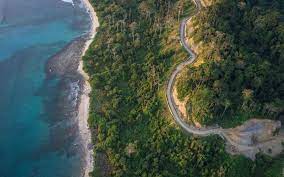
The Union Ministry of Environment, Forest and Climate Change gave environmental clearance for the ambitious Rs 72,000 crore development project on the strategically important Great Nicobar Island.
- The idea of developing Great Nicobar was first proposed in the 1970s, and its significance for national security and the consolidation of the Indian Ocean Region has been emphasised time and again.
- In recent years, increasing Chinese assertiveness in the Bay of Bengal and the Indo-Pacific has added urgency to this requirement.
About the Great Nicobar Island:
- Great Nicobar, the southernmost of the Andaman and Nicobar Islands, has an area of 910 sq km.
- The Andaman and Nicobar Islands are a cluster of about 836 islands in the eastern Bay of Bengal, the two groups of which are separated by the 150-km wide Ten Degree Channel.
- The Andaman Islands lie to the north of the channel, and the Nicobar Islands to the south.
- Indira Point on the southern tip of Great Nicobar Island is India’s southernmost point, less than 150 km from the northernmost island of the Indonesian archipelago.
- It covers 1,03,870 hectares of unique and threatened tropical evergreen forest ecosystems.
- It is home to a very rich ecosystem, including 650 species of angiosperms, ferns, gymnosperms, bryophytes, among others.
- In terms of fauna, there are over 1800 species, some of which are endemic to this area.
- The Great Nicobar Biosphere Reserve harbours a wide spectrum of ecosystems comprising tropical wet evergreen forests, mountain ranges reaching a height of 642 m (Mt. Thullier) above sea level, and coastal plains.
Global Partnership On Artificial Intelligence:

India has been handed over the presidency Global Partnership on Artificial Intelligence (GPAI) for 2022-23 by the outgoing Council Chair, France in its 3rd Annual Summit in Japan.
- This development comes on the heels of assuming the Presidency of the G20, a league of the world’s largest economies.
Highlights of the Annual GPAI summit:
- Tokyo is the first Asian city to host this summit.
- The meeting discussed these four themes:
- Responsible AI,
- Data governance,
- Future of work,
- Innovation and commercialisation.
- With National Programme on AI in place and a National Data Governance Framework Policy (NDGFP), India highlighted its commitment to efficient use of AI for catalyzing innovation ecosystem around AI.
- The NDGFP aims to ensure equitable access to non-personal data and focus on improving the institutional framework for government data sharing, promoting principles around privacy and security by design, and encouraging the use of anonymization tool.
GPAI:
- It was launched in June, 2020, with fifteen members.
- The Global Partnership in Artificial Intelligence is described as the ‘fruition of an idea developed within the G7.’
- It is a multi-stakeholder initiative on artificial intelligence (AI), which aims to fill what it describes as ‘the gap between theory and practice on AI,’ by supporting cutting-edge research, as well as applied activities, on AI-related priorities.
- The initiative facilitates international cooperation on artificial technology by bringing together on a single platform, experts from fields such as science, industry, civil society, governments, international bodies, and academia.
- At present, GPAI has twenty-five member states:
- Australia, Belgium, Brazil, Canada, Czech Republic, Denmark, France, Germany, India, Ireland, Israel, Italy, Japan, Mexico, the Netherlands, New Zealand, Poland, the Republic of Korea (South Korea), Singapore, Slovenia, Spain, Sweden, the United Kingdom, the United States, and the European Union (EU).
Olive Ridley Turtles : Updates
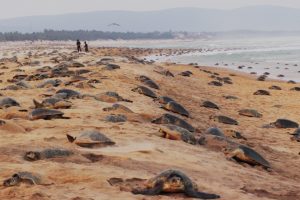
Pairs of Olive Ridley Sea turtles have begun emerging on the sea waters off Gahirmatha Marine Sanctuary along the Odisha coast, marking the commencement of the annual mass nesting of these endangered marine species.
- The Olive ridley turtles are the smallest and most abundant of all sea turtles found in the world.
- These turtles are carnivores and get their name from their olive-coloured carapace.
- They are best known for their unique mass nesting called Arribada, where thousands of females come together on the same beach to lay eggs.
- They are found in warm waters of the Pacific, Atlantic and Indian oceans.
- The Odisha’s Gahirmatha Marine Sanctuary is known as the world’s largest rookery (colony of breeding animals) of sea turtles.
- Protection Status:
- Wildlife Protection Act, 1972: Schedule 1
- IUCN Red List: Vulnerable
- CITES: Appendix I
National Suicide Prevention Strategy:
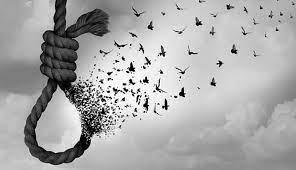
The Ministry of Health and Family Welfare, Government of India has announced the “National Suicide Prevention Strategy”.
- It is the first of its kind in the country, with time-bound action plans and multi-sectoral collaborations to achieve reduction in suicide mortality by 10% by 2030.
- The strategy is in line with the World Health Organisation’s South East-Asia Region Strategy for suicide prevention.
- The strategy broadly seeks to establish effective surveillance mechanisms for suicide within the next three years.
- It seeks to establish psychiatric outpatient departments that will provide suicide prevention services through the District Mental Health Programme in all districts within the next five years.
- It also aims to integrate a mental well-being curriculum in all educational institutions within the next eight years.
- It envisages developing guidelines for responsible media reporting of suicides, and restricting access to means of suicide.
25th National Conference On e-Governance:
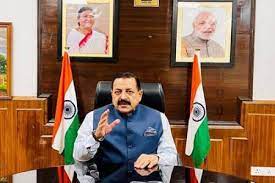
Union Minister Dr Jitendra Singh to inaugurate the 25th National Conference on e-Governance (NCeG) to be held in Katra, Jammu & Kashmir on 26th November, 2022.
- Theme: “Bringing citizens, industry and government closer”.
- Presented by: Department of Administrative reforms & Public Grievances (DAR&PG) presents National Awards every year during National conference on e-Governance.
- Objective: To recognize and promote Excellence in implementation of e-Governance initiatives.
- The Award recognizes some of the best Government to Government (G to G), Government to Citizen (G to C), Government to Business (G to B) initiatives taken by government departments.
- It also recognizes initiatives in Start-ups, Academic Research Institutions as well as initiatives in adopting emerging technologies.
- It will be presented under 5 categories of the NAeG Scheme – 2022 to 18 e-Governance initiatives at Central, State and District levels, Academic & Research Institutions and Public Sector Undertaking.
- This includes 9 Gold and 9 Silver Awards.
World Fisheries Day 2022:
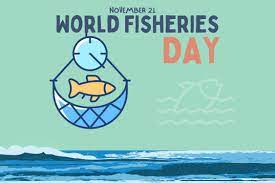
The Department of Fisheries under Ministry of Fisheries, Animal Husbandry and Dairying, Government of India and National Fisheries Development Board, celebrated the ‘World Fisheries Day’ in Daman.
- World Fisheries Day is celebrated on 21st November every year to demonstrate solidarity with all fisher folk, fish farmers and concerned stakeholders throughout the world.
- It started in 1997 where “World Forum of Fish Harvesters & Fish Workers” met at New Delhi leading to formation of “World Fisheries Forum” with representatives from 18 countries and signed a declaration advocating for a global mandate of sustainable fishing practices and policies.
- The event aims to draw attention to overfishing, habitat destruction and other serious threats to the sustainability of our marine and freshwater resources.
- The celebrations serve to focus on changing the way the world manages global fisheries to ensure sustainable stocks and healthy ecosystems.
Qatar, China Gas Supply Deal:

QatarEnergy recently announced a 27-year natural gas supply deal with China.
- QatarEnergy will send four million tonnes of liquefied natural gas annually from its new North Field East project to China Petroleum and Chemical Corporation (Sinopec).
- The deal “marks the longest gas supply agreement in the history of the LNG industry”.
- Asian countries led by China, Japan and South Korea are the main market for Qatar’s gas, which is increasingly being sought by European countries since Russia’s invasion of Ukraine.
- North Field is at the centre of Qatar’s expansion of its liquefied natural gas production by more than 60% to 126 million tonnes a year by 2027.
- North field accounts approximately 10% of the world’s known reserves.
- China is the first country to seal a deal for North Field East.




